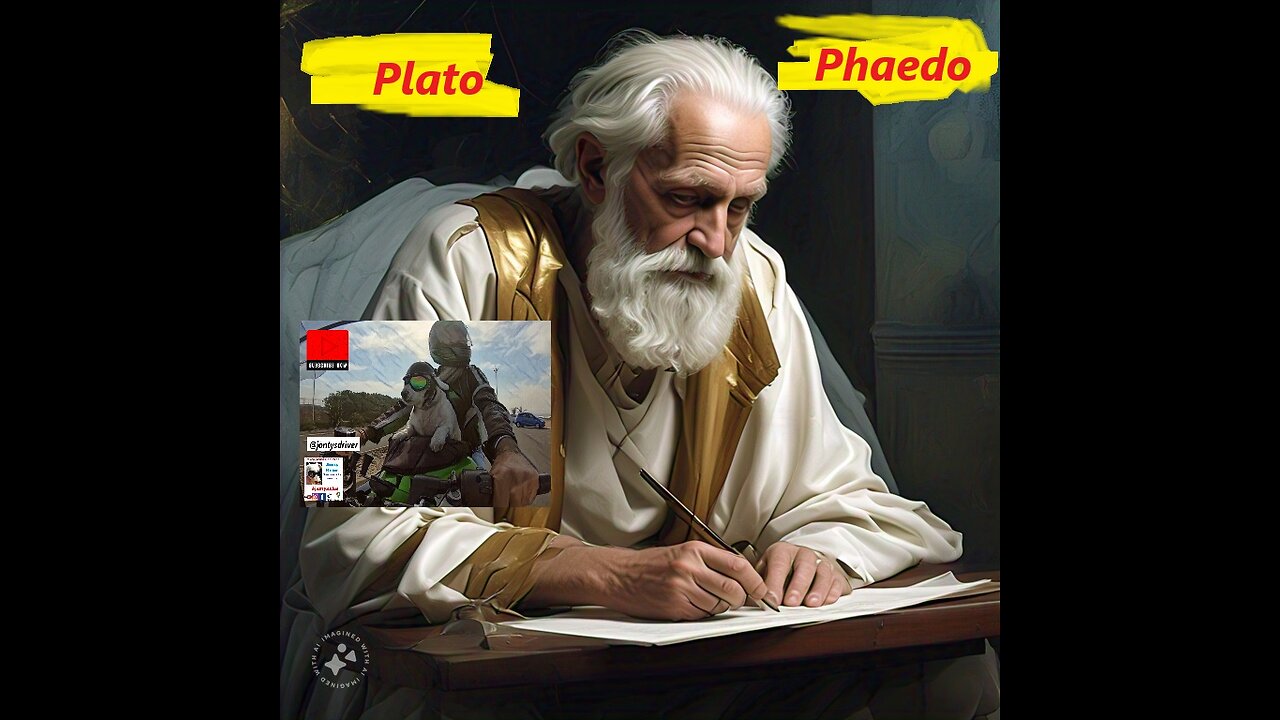Premium Only Content

Plato - Phaedo
#Plato - #Phaedo
Plato’s Phaedo recounts the final hours of Socrates before his execution and explores profound philosophical discussions about the immortality of the soul, the nature of death, and the pursuit of wisdom. The dialogue takes place in Socrates' prison cell, where he converses with his friends before drinking the hemlock. Here’s a summary:
Setting and Characters
Setting: The dialogue is narrated by Phaedo, a disciple of Socrates, to Echecrates, a fellow philosopher.
Key Participants: Socrates, Phaedo, Cebes, Simmias, and others.
Summary
Introduction:
Phaedo recounts Socrates' calm demeanor and philosophical reflections as he faces death.
Socrates asserts that a true philosopher does not fear death because it is a release of the soul from the body, allowing the pursuit of ultimate truth.
The Nature of Death:
Socrates defines death as the separation of the soul from the body.
He argues that the body, with its desires and distractions, hinders the soul’s pursuit of knowledge. Philosophers, therefore, practice for death by focusing on the life of the soul.
Arguments for the Soul’s Immortality:
The Cyclical Argument (Opposites Argument): Life and death are opposites, and just as the living come from the dead, the dead must return to life. This cycle suggests the soul’s continuity.
The Theory of Recollection: Learning is essentially remembering knowledge that the soul possessed before birth, indicating the soul existed before life.
The Affinity Argument: The soul is more like the eternal, unchanging realm of Forms than the physical body, which is perishable. This suggests the soul is immortal and divine.
The Final Argument (Argument from Form of Life): The soul is connected to life itself and cannot admit its opposite, death. Therefore, the soul is imperishable.
Challenges and Counterarguments:
Cebes and Simmias raise objections:
Simmias: Compares the soul to the harmony of a lyre, suggesting it may perish when the body does.
Cebes: Worries the soul might outlast many bodies but not be eternal.
Socrates addresses these objections, using reason and analogy to defend his arguments for the soul’s immortality.
Socrates’ Final Moments:
Socrates explains that the philosopher should welcome death as a gateway to true wisdom.
After a final discussion about the soul and an expression of gratitude to Asclepius (god of healing), Socrates drinks the poison calmly and dies peacefully.
Themes
Immortality of the Soul: The dialogue offers various arguments for the eternal nature of the soul.
Philosophy as Preparation for Death: Socrates views the philosopher’s life as a preparation for the soul's liberation from the body.
The Nature of Knowledge and Reality: The distinction between the physical, perishable world and the eternal world of Forms is central to the dialogue.
Virtue and Detachment: Socrates exemplifies a life of virtue and rational detachment from bodily concerns.
Conclusion
The Phaedo portrays Socrates’ serene acceptance of death and his unwavering commitment to his philosophical principles. It serves as a profound meditation on the soul, the afterlife, and the philosopher’s pursuit of truth, leaving a lasting legacy on Western thought.
Just a driver on a bike with a dog named @jontyknine
https://www.jontyknine.co.za/driver-contact/
https://www.jontyknine.co.za/driver-contact/
061 513 1103
jontysdriver@gmail.com
Consider a donation to buy food or clothes
https://www.jontyknine.co.za/support/
Shop:
https://www.jontyknine.co.za/shop/
https://my-store-e3d751.creator-spring.com/
#jonty #jontyknine #jontyk9 #durban #biker #dogs #dogsofyoutube #adventure #travell #bikerdog #southafrica #africa #bmw #f800gs
-
 53:28
53:28
Candace Show Podcast
6 hours agoBecoming Brigitte: Jean-Michel Trogneux | Ep 4
74.7K44 -
 UPCOMING
UPCOMING
Tundra Tactical
1 hour agoHeroes in Texas Stop DEADLY School Shooting!
41 -
 UPCOMING
UPCOMING
Chrissy Clark
29 minutes agoFEMA’s Corruption EXPOSED, Trump Assassination Update, & The Rebrand Reveal I Underreported Stories
-
 UPCOMING
UPCOMING
The Big Mig™
2 hours agoCelebrate American Exceptionalism 2025 w/ Mary Flynn O’Neill
1192 -
 1:23:59
1:23:59
Redacted News
3 hours agoBREAKING! CORRUPT FBI CAUGHT HELPING ILLEGALS AVOID ICE ARRESTS, HOMAN READY TO PROSECUTE | Redacted
99.5K131 -
 1:18:39
1:18:39
Awaken With JP
1 day agoThe Latest in the Resurrection of America - LIES Ep 78
88.9K24 -
 1:55:58
1:55:58
Revenge of the Cis
4 hours agoEpisode 1445: Too Much Breakfast Club
26.3K3 -
 1:17:58
1:17:58
Game On!
5 hours ago $0.35 earnedPUMP THE BRAKES! It's college basketball season now!
13.7K1 -
 1:07:56
1:07:56
John Crump Live
19 hours ago $1.31 earnedLawyer Talk Ft. AOR (Backed Out) & Fudd Busters
33K1 -
 55:12
55:12
Benny Johnson
4 hours agoCongress Makes BOMBSHELL Announcement LIVE Now on Epstein List, JFK, UFOS | 'All Will Be REVEALED!'
117K144